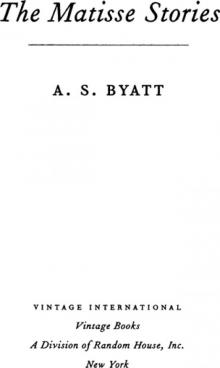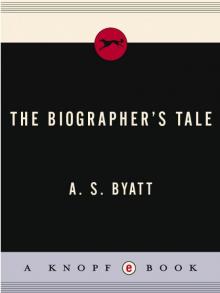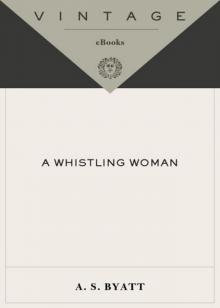- Home
- A. S. Byatt
Sugar and Other Stories Page 3
Sugar and Other Stories Read online
Page 3
After the April foolery, Miss Crichton-Walker said she would not have believed the girls were capable of it. No one, no one Emily knew at least, knew how the folly had started. It was ‘passed on’, in giggled injunctions, returning again embroidered to earlier tellers. It must have originated with some pair, or pairs, of boys and girls who had managed to make contact at the static dance, who had perhaps sat a few waltzes out together, as Miss Crichton-Walker had bidden. The instruction they all received was that on Sunday April 1st the boys were to sit on the girls’ side of the church and vice versa. Not to mingle, that is. To change places en bloc, from the bride’s side to the bridegroom’s. No rationale was given for this jape, which was immediately perceived by all the girls and boys involved as exquisitely funny, a kind of epitome of disorder and misrule. The bolder spirits took care to arrive early, and arrange themselves decorously in their contrary pews. The others followed like meek sheep. To show that they were not mocking God, the whole congregation then worshipped with almost unnatural fervour and devotion, chanting the responses, not wriggling or shifting in their seats. The Vicar raised his eyebrows, smiled benignly, and conducted the service with no reference to the change.
Miss Crichton-Walker was shocked, or hurt, to the quick. It was as though, Emily thought very much later, some kind of ritual travesty had happened, the Dionysiac preparing of Pentheus, in his women’s skirts, for the maenads to feast on. Though this analogy is misleading: Miss Crichton-Walker’s anguish was a kind of puritanical modesty. What outraged her was that, as she saw it, she, and the institution of which she was the head, had been irrevocably shamed in front of the enemy. In the icy little speech she made to the school at the next breakfast she did not mention any insult to the church, Emily was almost sure. Nor did she dart barbs of precise, disgusted speech at the assembled girls: she was too upset for that. Uncharacteristically she wavered, beginning “Something has happened … something has taken place … you will all know what I am speaking of …” gathering strength only when she came to her proposed expiation of the sin. “Because of what you have done,” she said, “I shall stand here, without food, during all today’s meals. I shall eat nothing. You can watch me while you eat, and think about what you have done.’
Did they? Emily’s uncertainty about the thoughts of the others held for this extraordinary act of vicarious penance, too. Did they laugh about it? Were they shocked and anxious? Through all three meals of the day they ate in silence, forks clattering vigorously on plates, iron spoons scraping metal trays, amongst the smell of browned shepherd’s pie and institutional custard, whilst that little figure stood, doll-like, absurd and compelling, her fine lips pursed, her judicial curls regular round her motionless cheeks. Emily herself, as always, she came to understand, reacted with a fatal doubleness. She thought Miss Crichton-Walker was behaving in an undignified and disproportionate manner. She felt, gloomily and heavily, that she had indeed greatly damaged Miss Crichton-Walker, had done her a great and now inexpiable wrong, for which Miss Crichton-Walker was busily heaping coals of fire on her uncomprehending but guilty head. Miss Crichton-Walker was atoning for Emily’s sin, which Emily had not, until then, known to be a sin. Emily was trapped.
When the A-level exams came, Emily developed a personality, not perhaps, you will think, a very agreeable one. She was approaching a time when her skills would be publicly measured and valued, or so she thought, as she became increasingly aware that they were positively deplored, not only by the other girls, but by Miss Crichton-Walker. The school was academically sound but made it a matter of principle not to put much emphasis on these matters, to encourage leadership, community spirit, charity, usefulness and other worthy undertakings. Girls went to university but were not excessively, not even much praised for this. Nevertheless, Emily knew it was there. At the end of the tunnel — which she visualized, since one must never allow a metaphor to lie dead and inert, as some kind of curving, tough, skinny tube in which she was confined and struggling, seeing the outside world dimly and distorted — at the end of the tunnel there was, there must be, light and a rational world full of aspiring Readers. She prepared for the A level with a desperate chastity of effort, as a nun might prepare for her vows. She learned to write neatly, overnight it seemed, so that no one recognized these new, confident, precisely black unblotted lines. She developed a pugnacious tilt to her chin. Someone in her form took her by the ears and banged her head repeatedly on the classroom wall, crying out “you don’t even have to try, you smug little bitch …” but this was not true. She struggled secretly for perfection. She read four more of Racine’s plays, feverishly sure that she would, when the time came, write something inadequate, ill-informed about his range, his beliefs, his wisdom. As I write, I can feel you judging her adversely, thinking, what a to-do, or even, smug little bitch. If I had set out to write a story about someone trying for perfection as a high diver, perhaps, or as a long distance runner, or even as a pianist, I should not so have lost your sympathy at this point. I could have been sure of exciting you with heavy muscles going up the concrete steps for the twentieth or thirtieth time, with the smooth sheet of aquamarine always waiting, the rush of white air, white air in water, the drum in the eardrums, the conversion of flesh and bone to a perfect parabola. You would have understood this in terms of some great effort of your own, at some time, as I now take pleasure in understanding the work of televised snooker players, thinking a series of curves and lines and then making these real, watching the balls dart and clatter and fall into beautiful shapes, as I also take pleasure in the skill of the cameramen, who can show my ignorant eye, picking out this detail and that, where the beautiful lines lie, where there are impossibilities in the way, where the danger is, and where success.
Maybe I am wrong in supposing that there is something inherently distasteful in the struggles of the solitary clever child. Or maybe the reason is not that cleverness — academic cleverness — is distasteful, but that writing about it is déjà-vu, wearisome. That’s what they all become, solitary clever children, complaining writers, misunderstood. Not Emily. She did not become a writer, about her misunderstood cleverness or anything else.
Maybe you are not unsympathetic at all, and I have now made you so. You can do without a paranoid narrator. Back to Miss Crichton-Walker, always in wait.
On the evening before the first exam, Miss Crichton-Walker addressed to the whole school one of her little homilies. It was summer, and she wore a silvery grey dress, with her small silver brooch. In front of her was a plain silver bowl of flowers — pink roses, blue irises, something white and lacy and delicate surrounding them. The exams, she told the school, were due to begin tomorrow, and she hoped the junior girls would remember to keep quiet and not to shout under the hall windows whilst others were writing. There were girls in the school, she said, who appeared to attach a great deal of importance to exam results. Who seemed to think that there was some kind of exceptional merit in doing well. She hoped she had never allowed the school to suppose that her own values were wrapped up in this kind of achievement. Everything they did mattered, mattered very much, everything was of extreme importance in its own way. She herself, she said, had written books, and she had embroidered tablecloths. She would not say that there was not as much lasting value, as much pleasure for others, in a well-made tablecloth as in a well-written book.
While she talked, her eyes appeared to meet Emily’s, steely and intimate. Any good speaker can do this, can appear to single out one or another of the listeners, can give the illusion that all are personally addressed. Miss Crichton-Walker was not a good speaker, normally: her voice was always choked with emotion, which she was not so much sharing as desperately offering to the stony, the uncaring of her imagination. She expected to be misunderstood, even in gaudier moments to be reviled, though persisting. Emily understood this without knowing how she knew it, or even that she knew it. But on this one occasion she knew with equal certainty that Miss Crichton-Walker’s words were for her, th
at they were delivered with a sweet animus, an absolute antagonism into which Miss Crichton-Walker’s whole cramped self was momentarily directed. At first she stared back angrily, her little chin grimly up, and thought that Miss Crichton-Walker was exceedingly vulgar, that what mattered was not exam results, God save the mark, but Racine. And then, in a spirit of almost academic justice, she tried to think of the virtue of tablecloths, and thought of her own Auntie Florence, in fact a great-aunt. And, after a moment or two, twisted her head, broke the locked gaze, looked down at the parquet.
In the Potteries, she had many great-aunts. Auntie Annie, Auntie Ada, Auntie Miriam, Auntie Gertrude, Auntie Florence. Auntie Florence was the eldest and had been the most beautiful. She had always looked after her mother, in pinched circumstances, and had married late, having no children of her own, though always, Emily’s mother said, much in demand to look after other people’s. Her mother had died when Florrie was fifty-four, demented and senile. Her husband had had a stroke, that year, and had lain helplessly in bed for the next ten, fed and tended by Auntie Florrie. She had had, in her youth, long golden hair, so long she could sit on it. She had always wanted to travel abroad, Auntie Florrie, whose education had ceased formally at fourteen, who read Dickens and Trollope, Dumas and Harriet Beecher Stowe. When Uncle Ted died at last, Aunt Florrie had a little money and thought she might travel. But then Auntie Miriam sickened, went off her feet, trembled uncontrollably and Florrie was called in by her children, busy with their own children. She was the one who was available, like, Emily’s mother said. She had always been as strong as a horse, toiling up and down them stairs, fetching and carrying for Gran, for Uncle Ted, and then for poor Miriam. She always looked so wholesome and ready for anything. But she was seventy-two when Miriam died and arthritis got her. She couldn’t go very far. She went on with the embroidery she’d always done, beautiful work of all kinds, bouquets and arabesques and trellises of flowers in jewelled colours on white linen, or in white silk on white pillowcases, or in rainbow colours and patterns from every century, Renaissance, Classical, Victorian, Art Nouveau, on satin cushion covers. If you went to see her you took her a present of white satin to work on. She liked heavy bridal satin best. She liked the creamy whites and could never take to the new glaring whites in the nylon satins. When she was eighty-five the local paper had an article in it about her marvellous work, and a photograph of Auntie Florrie in her little sitting-room, sitting upright amongst all the white rectangles of her needlework, draped on all the furniture. Aunt Florrie still wore a woven crown of her own thinning hair. She had a good neighbour, Emily’s mother said, who came in and did for her. She couldn’t do much work, now, though. The arthritis had got her hands.
After Miss Crichton-Walker’s little talk, Emily began to cry. For the first half-hour of the crying she herself thought that it was just a nervous reaction, a kind of irritation, because she was so strung-up for the next day’s examination, and that it would soon stop. She cried at first rather noisily in a subterranean locker-room, swaying to and fro and gasping a little, squatting on a bench above a metal cage containing a knot of canvas hockey boots and greying gym shoes. When bed-time came, she thought she ought to stop crying now, she had had her time of release and respite. She must key herself up again. She crept sniffing out into the upper corridors, where Flora Marsh met her and remarked kindly that she looked to be in a bad way. At this Emily gave a great howl, like a wounded creature, and alarmed Flora by staggering from side to side of the corridor as though her sense of balance were gone. Flora could get no sense out of her: Emily was dumb: Flora said perhaps she should go to the nursery, which was what they called the sick bay, should see Sister. After all, they had A-level Latin the next day, she needed her strength. Emily allowed herself to be led through the already-darkened school corridors, moaning a little, thinking, inside her damp and sobbing head in a lucid tic-tac, that she was like an ox, no, like a heifer it would have to be, like Keats’s white heifer in the Grecian urn … lowing at the skies … Dusty round white lamps hung cheerlessly from metal chains.
Sister was a small, wiry, sensible widow in a white coat and flat rubber-soled shoes. She made Emily a cup of Ovaltine, and put her into an uncomfortable but friendly cane armchair, where Emily went on crying. It became clear to all three of them that there was no prospect of Emily ceasing to cry. The salt tears flooded and filmed her eyes, brimmed over and ran in wet sheets down her face, flowing down her neck in cold streamlets, soaking her collar. The tic-tac in Emily’s mind thought of the death of Seneca, the life simply running away, warm and wet, the giving-up. Sister sent Flora Marsh to fetch Emily’s things, and Emily, moving her arms like a poor swimmer in thick water, put on her nightdress and climbed into a high hospital bed in the nursery, a hard, cast-iron headed bed, with white cotton blankets. The tears, now silent, darkened and gathered in the pillow. Emily put her knees up to her chin and turned her back on Sister, who pulled back some wet hair, out of her nightdress collar. What has upset her, Sister asked Flora Marsh. Flora didn’t know, unless it was something the Headmistress had said. Emily heard them at a huge distance, minute in a waste of waters. Would she be fit to take her exams, Flora asked, and Sister replied, with a night’s sleep.
Emily was double. The feeling part had given up, defeated, abandoned to the bliss of dissolution. The thinking part chattered away toughly, tapping out pentameters and alexandrines with and against the soothing flow of the tears. The next morning the feeling part, still watery, accepted tea and toast shakily from Sister; the thinking part looked out craftily from the cavern behind the glistening eyes and stood up, and dressed, and went wet-faced to the Latin exam. There Emily sat, and translated, and scanned, and constructed sentences and paragraphs busily, for a couple of hours. After, a kind of wild hiccup broke in her throat and the tears started again, as though a tap had been turned on, as though something, everything, must be washed away. Emily crept back to the nursery and lay on the iron bed, cold-cheeked and clammy, buffeted by a gale of tags from Horace, storm-cries from Lear, domestic inanities from Mrs Bennett, subjunctives and conditionals, sorting and sifting and arranging them, tic-tac, whilst the tears welled. In this way she wrote two German papers, and the English. She was always ready to write but could never remember what she had written, dissolved in tears, run away. She was like a runner at the end of a marathon, moving on will, not on blood and muscle, who might, if you put out a hand to touch him, fall and not rise again.
She received a visit. There was an empty day between the English and the final French, and Emily lay curled in the iron bed, weeping. Sister had drawn the blinds half-way down the windows, to close out the glare of the summer sun, and the cries of tennis players on the grass courts out in the light. In the room the air was thick and green like clouded glass, with pillars of shadow standing in it, shapes underwater. Miss Crichton-Walker advanced precisely towards the bedside, bringing her own shadow, and the creak of rubber footsteps. Her hair in the half-light glistened green on silver: her dress was mud-coloured, or seemed so, with a little, thickly-crocheted collar. She pulled out a tubular chair and sat down, facing Emily, her hands folded composed in her lap, her knees tightly together, her lips pursed. Crying had not thickened Emily’s breathing but vacated its spaces: Miss Crichton-Walker smelled very thinly of moth-balls, which, in the context, Emily interpreted as the sharp mustiness of ether or chloroform, a little dizzy. She lay still. Miss Crichton-Walker said, “I am sorry to hear that you are unwell, Emily, if that is the correct term. I am sorry that I was not informed earlier, or I should have come to see you earlier. I should like you to tell me, if you can, why you are so distressed.’
“I don’t know,” said Emily, untruthfully.
“You set high store by these examinations, I know,’ said the mild voice, accusing. “Perhaps you overreached yourself in some way, overextended yourself, were overambitious. It is a pity, I always think, to force young girls to undergo these arbitrary stresses of judgment when it should sure
ly be possible more accurately to judge the whole tenor of their life and work. Naturally I shall write to the Board of Examiners if you feel — if I feel — you may not quite have done yourself justice. That would be a great disappointment but not a disaster, not by any means a disaster. There is much to be learned in life from temporary setbacks of this kind.”
“I have sat all my papers,” said Emily’s drugged, defensive voice. Miss Crichton-Walker went on.
“I always think that one real failure is necessary to the formation of any really resolved character. You cannot expect to see it that way just now, but I think you will find it so later, if you allow yourself to experience it fully.”
Emily knew she must fight, and did not know how. Half of her wanted to respond with a storm of loud crying, to drown this gentle concerned voice with rude noise. Half of her knew, without those words, that that way was disaster, was capitulation, was the acceptance of this last, premature judgment. She said, “If I don’t talk, if I just go on, I think I may be all right, I think.”
“You do not seem to be all right, Emily.”
Emily began to feel faint and dizzy as though the mothballs were indeed anaesthetic. She concentrated on the area below the judging face: the little knots and gaps in the crochet work, which lay sluggish and inexact, as crochet, even the best, always will, asymmetrical daisies bordered with little twisted cords. Little twisted cords of the soft thick cotton were tied at Miss Crichton-Walker’s neck, in a constricting little bow that gathered and flounced the work and then hung down in two limp strands, each nearly knotted at its end. Where was Racine, where was the saving thread of reasoned discourse, where the Reader’s dry air? The blinds bellied and swayed slightly. A tapestry of lines of verse like musical notation ran through Emily’s imagination as though on an endless rolling scroll, the orderly repetitious screen of the alexandrine somehow visually mapped by the patterning of Aunt Florrie’s exquisite drawn-thread work, little cornsheaves of threads interspersed by cut openings, tied by minute stitches, a lattice, a trellis.

 The Children's Book
The Children's Book Babel Tower
Babel Tower The Matisse Stories
The Matisse Stories Peacock & Vine: On William Morris and Mariano Fortuny
Peacock & Vine: On William Morris and Mariano Fortuny Elementals: Stories of Fire and Ice
Elementals: Stories of Fire and Ice Sugar and Other Stories
Sugar and Other Stories Possession
Possession Little Black Book of Stories
Little Black Book of Stories The Djinn in the Nightingale's Eye
The Djinn in the Nightingale's Eye The Virgin in the Garden
The Virgin in the Garden The Game
The Game The Biographer's Tale
The Biographer's Tale A Whistling Woman
A Whistling Woman Ragnarok
Ragnarok Angels & Insects: Two Novellas
Angels & Insects: Two Novellas Ragnarok: the End of the Gods (Myths)
Ragnarok: the End of the Gods (Myths) Peacock & Vine
Peacock & Vine The Djinn in the Nightingale's Eye (Vintage International)
The Djinn in the Nightingale's Eye (Vintage International) Angels and Insects
Angels and Insects The Arabian Nights: Tales from a Thousand and One Nights (Modern Library Classics)
The Arabian Nights: Tales from a Thousand and One Nights (Modern Library Classics) Elementals
Elementals